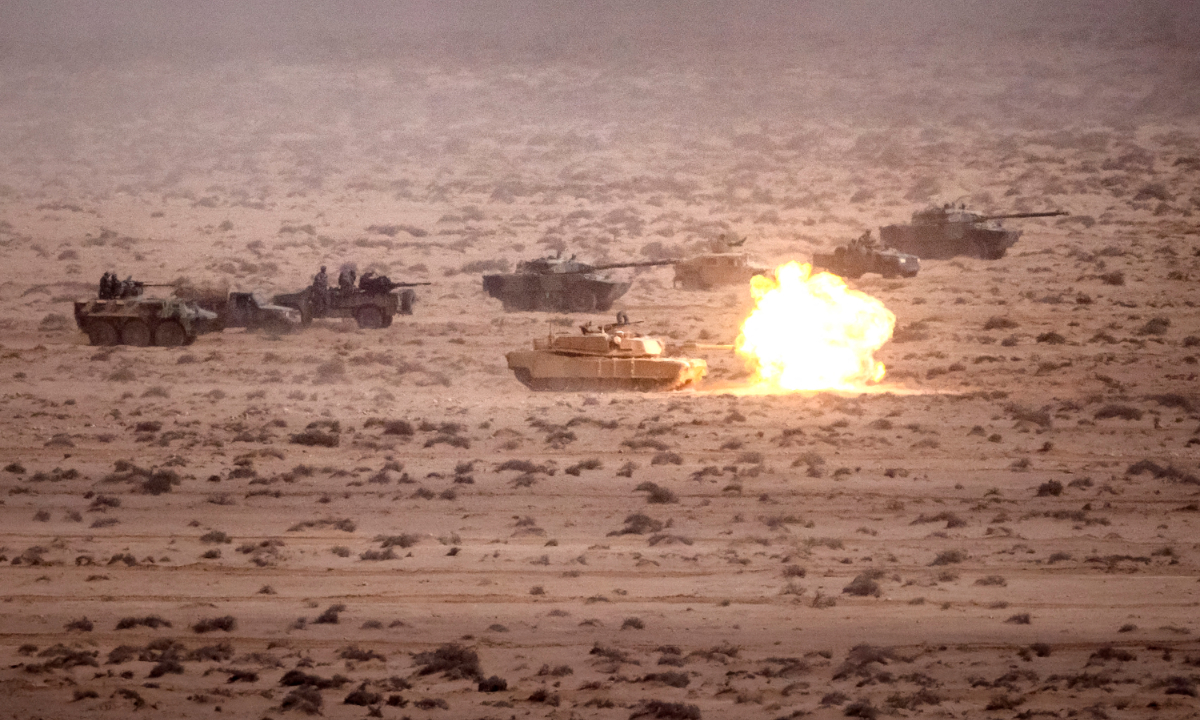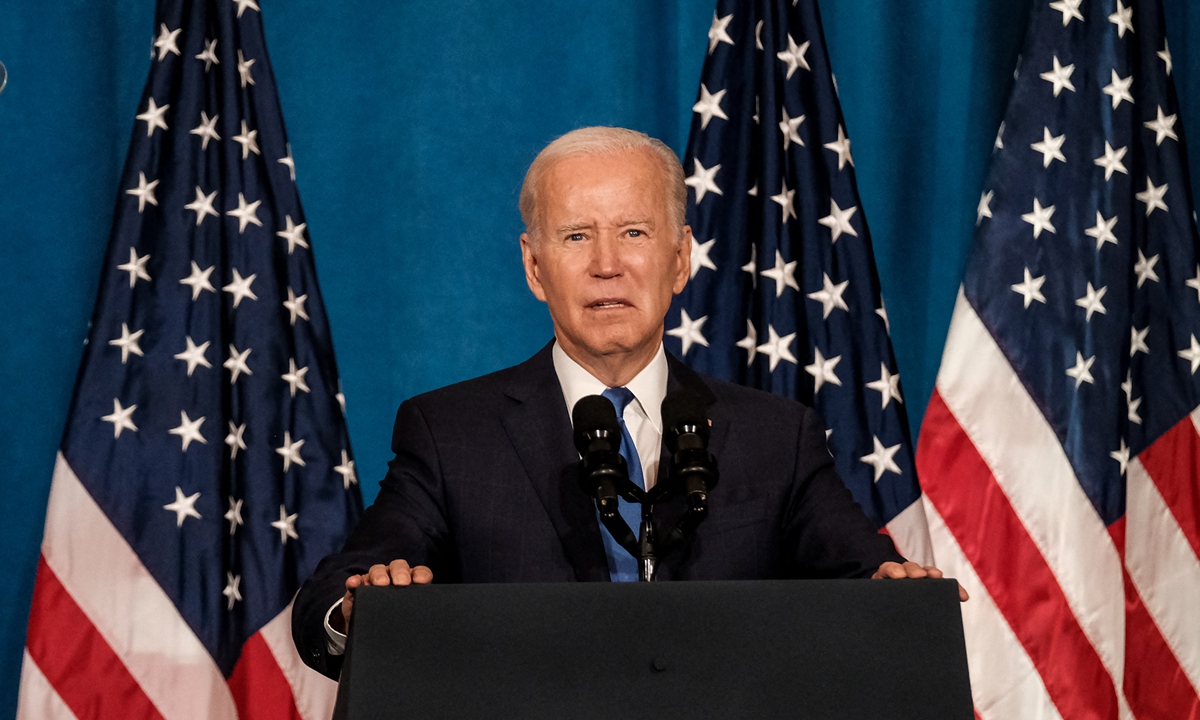
A US army M1 Abrams main battle tank fires a round during the second annual "African Lion" military exercise in the Tan-Tan region in southwestern Morocco on June 30, 2022. File photo: AFP
Although it is uncertain how this will help the Ukrainian army to improve its combat capabilities, the announcement by the US and Germany that they will provide Ukraine with offensive tanks will undoubtedly drag Russia and Ukraine into a quagmire, pushing the end of this conflict further away.
US President Joe Biden announced on Wednesday that his administration will provide Ukraine with 31 US-made M1 Abrams tanks, which Russia has said would be its target if they were to be used in the ongoing conflict between Moscow and Kiev.
Meanwhile, German Chancellor Olaf Scholz announced its government's decision of providing Germany's Leopard 2 tanks as a part of its effort to strengthen German military support for Ukraine.
Following the US and Germany, more allies are expected to join. Poland, the Netherlands, Norway, Spain, and Finland are among the list. In total, Ukraine's European allies would send about 80 tank vehicles to the frontline, Politico reported on Wednesday night.
The move worsened the already complex situation of the conflict between Russia and Ukraine.
At a press briefing in Moscow on Wednesday, Kremlin spokesman Dmitry Peskov blamed Western countries of sending tanks to Ukraine, saying that there are no prospects for the resumption of Russia-Ukraine peace talks. Peskov noted that if Abrams tanks are delivered to Ukraine, they "will burn like all other tanks," but as they are expensive, the European taxpayers will bear the financial burden while "Americans, as always, will remain at least with their own, and most likely - with good profits."
Chinese analysts noted that even though it is not sure if the Ukrainian troops could handle the advanced aggressive weapons provided by its Western allies, the current situation is "not positive."
Analysts warn that the actions of Western countries further interfering in the conflict will intensify and even lead the current Russia-Ukraine conflict to reach an "unimaginable level of confrontation."
A tricky deedFrom defensive arms to aggressive tanks, the West has gradually increased its military assistance to Ukraine. However, questions remain about how the tanks will help Ukrainian troops and influence the course of the Russia-Ukraine conflict, analysts noted.
"Now the conflict between Ukraine and Russia is mainly on land, so the main performance on the battlefield depends mainly on the quality and capability of weapons and soldiers. At present, Ukraine is obviously in a passive role," Li Haidong, a professor at the Institute of International Relations at the China Foreign Affairs University, told the Global Times on Thursday.
"Russia has strong land combat capabilities, while the US and Germany want to improve Ukraine's military capabilities by providing main battle tanks to Ukraine," he said. "These land warfare weapons will undoubtedly enhance Ukraine's military strength, but on the battlefield, many factors will play a role, including military strategic deployment and the quality of soldiers."
An anonymous military source observed that "Ukraine is using weapons and equipment temporarily supported by various countries and may face problems of insufficient personnel training and insufficient logistical support."
The M1 Abrams' "complex electronic components and especially their gas turbine propulsion systems" could make them particularly difficult to operate and maintain, according to The Warzone, a defense-analysis website. "In other words, the US can't just send its M1s to Ukraine," the website said.
Moreover, the tanks provided by the US and Germany are all heavy-duty main battle tanks, which operate fine in winter. But in spring and summer when the roads become muddy, the tanks' performance would be affected, the military analyst said. "By contrast, Russia's T72 and T90 tanks, which are lighter, have stronger mobility."
"At this stage, the supply of weapons (air defense systems, heavy tanks, small and medium-range missiles) will help the Ukrainian army to hold the front and prolong the conflict, increasing the losses on both sides," Sergey Biryukov, a professor at the Siberian Institute of Management in Novosibirsk of Russia, told the Global Times on Thursday.
However, Biryukov believed that tanks provided by the US and NATO countries are "still insufficient for the spring offensive" for Ukraine.
At the same time, the provision of long-range missiles and combat aircraft manufactured by NATO countries to Ukraine may contribute to a significant escalation of the situation; nevertheless, I believe that such a delivery is unlikely to take place in the near future, Biryukov said.

Photo: AFP
Add fuel to the fireRussia's bottom lines are constantly being breached. There is something terrifying about cornering a nuclear power, analysts noted.
After Biden and Scholz's announcement, the responses from Russia and the analyses of military and international relations experts suggested that the tanks will lead to a further counterattack against Russia, making the end of the conflict more unpredictable.
Russia's ambassador to Germany Sergey Nechaev condemned Germany's decision to send tanks to support Ukrainian defenses, saying it is "extremely dangerous" and will push the war to a "new level of confrontation."
Russia's Ambassador to the US Anatoly Antonov said on Wednesday that any delivery of American tanks to Ukraine would be seen as "another blatant provocation" by the West.
"If the US decide to supply tanks, it will be impossible to justify such step using arguments about 'defensive weapons,'" the envoy said. "This would be another blatant provocation against the Russian Federation."
On Thursday, Russia fired dozens of missiles toward Ukraine. Ukrainian military spokesman Yuriy Ignat said that "We expect more than 30 missiles, which have already started to appear in various territories. Air defense systems are operational," AFP reported.
"The escalation of the conflict can be ensured by the West supplying Ukraine with long-range missiles and combat aircraft in significant quantities, as well as the deployment of NATO military infrastructure in Ukraine without the official involvement of the North Atlantic Alliance in the conflict," Professor Biryukov said, adding that Poland or Romania, as the "juniors" of NATO, joining the conflict officially may also trigger the escalation.
At the same time, it should be recognized that the line between escalation and the "normal" course of the military conflict in Ukraine is quite thin and conditional, he said.
Biryukov believes that only a serious military conflict in another region of the world, a sharp increase in the economic crisis in Western countries, or the large-scale destabilization of the existing political regime in Ukraine due to internal factors, may distract the US and NATO from the Russia-Ukraine conflict and ease the current tension.
"Reaching a strategic agreement between Russia and Western countries on de-escalation and ending the conflict seems unlikely today," he noted.
Li Haidong said that "all in all, the US intended to use Ukraine to consume Russia, and finally reach the goal to permanently isolate Russia from Europe. "Although this goal is difficult to achieve, the US and its Western allies will sacrifice Ukraine, but never at the expense of their own."





